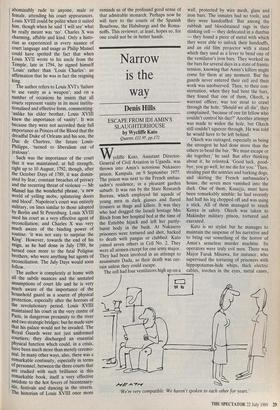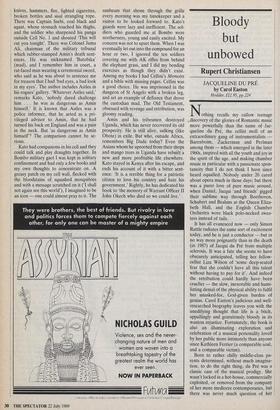Narrow is the way
Denis Hills
ESCAPE FROM ID! AMIN'S SLAUGHTERHOUSE by Wycliffe Kato
Quartet, £12.95, pp.172
Wycliffe Kato, Assistant Director- General of Civil Aviation in Uganda, was thrown into Amin's notorious Nakasero prison, Kampala, on 9 September 1977. The prison was next to the French ambas- sador's residence, in a pleasant garden suburb. It was run by the State Research Bureau, which employed hit squads of young men in dark glasses and flared trousers as thugs and killers. It was they who had dragged the Israeli hostage Mrs Bloch from her hospital bed at the time of the Entebbe hijack and left her partly- burnt body in the bush. At Nakasero prisoners were tortured and shot, hacked to death with pangas or clubbed. Kato joined seven others in Cell No. 2. They were all airmen except for one army major. They had been involved in an attempt to assassinate Dada, so their death was cer- tain unless they could escape. The cell had four ventilators high up on a wall, protected by wire mesh, glass and iron bars. The inmates had no tools, and they were handcuffed. But among the rubbish and bloodstained rags in their stinking cell — they defecated in a dustbin — they found a piece of metal with which they were able to unlock their handcuffs, and an old film projector with a stand which they used as a lever to bend one of the ventilator's iron bars. They worked on the bars for several days in a state of frantic tension, knowing that Amin's killers might come for them at any moment. But the guards never entered their cell and their work was unobserved. Then, to their con- sternation, when they had bent the bars, they found that one of them, Okech, a warrant officer, was too stout to crawl through the hole. 'Should we all die', they complained, 'because of one fat fellow who couldn't control his diet?' Another attempt was made to widen the hole, but Okech still couldn't squeeze through. He was told he would have to be left behind.
Okech was outraged, especially as being the strongest he had done more than the others to bend the bar. 'We must escape or die together,' he said. But after thinking about it, he relented. 'Good luck, good- bye, you go well, let me die for you.' Then, stealing past the sentries and barking dogs, and skirting the French ambassador's house, the seven men vanished into the dark. One of them, Kasujja, must have been remarkably nimble; he had recently had half his leg chopped off and was using a stick. All of them managed to reach Kenya in safety. Okech was taken to Makindye military prison, tortured and executed.
Kato is no stylist but he manages to maintain the suspense of his narrative and to bring out something of the horror of Amin's senseless murder machine. Its operators were truly evil men. There was Major Faruk Minawa, for instance, who supervised the torturing of prisoners with hippopotamus-hide whips, thick electric cables, torches in the eyes, metal canes, `We're very compatible. We haven't spoken to each other for years.' knives, hammers, fire, lighted cigarettes, broken bottles and sisal strangling rope. There was Captain Ssebi, coal black and squat, whose stomach touched his thighs, and the soldier who sharpened his panga outside Cell No. 1 and shouted 'This will cut you tonight'. There was Colonel Juma Ali, chairman of the military tribunal which rubber-stamped Amin's death sent- ences. He was nicknamed `Butobika' (mad), and I remember him in court, a rat-faced man wearing a ceremonial sword, who said as he was about to sentence me for treason that I had 'bad eyes, a bad look in my eyes'. The author includes Astles in his rogues' gallery. 'Whatever Astles said,' remarks Kato, 'nobody dared challenge him . . he was as dangerous as Amin himself.' It is known that Astles was a police informer, that he acted as a pri- vileged advisor to Amin, that he had turned his back on England and was a pain in the neck. But 'as dangerous as Amin himself? The comparison cannot be se- rious.
Kato had companions in his cell and they could talk and play draughts together. In Bombo military gaol I was kept in solitary confinement and had only a few books and my own thoughts to concentrate on. A greasy patch on my cell wall, flecked with the bloodstains of squashed mosquitoes and with a message scratched on it CI shall not again see this world'), I imagined to be an icon — one could almost pray to it. The sunbeam that shone through the grille every morning was my timekeeper and a visitor to be looked forward to. Kato's guards were lazy and inefficient. The sol- diers who guarded me at Bombo were northerners, young and easily excited. My concern was not to upset them. When I was eventually let out into the compound for an hour or two, I ignored the ten soldiers covering me with AK rifles from behind the elephant grass, and I did my bending exercises as though they didn't exist. Among my books I had Cellini's Memoirs and a bible with missing pages. Cellini was a good choice. He was imprisoned in the dungeon of St Angelo with a broken leg, and set an example of defiance that drove the custodian mad. The Old Testament, obsessed with revenge and retribution, was gloomy reading.
Amin and his tribesmen destroyed Uganda, which has never recovered its old prosperity. He is still alive, sulking (like Obote) in exile. But who, outside Africa, remembers Big Dada today? Even the Asians whom he uprooted from their shops and mango trees in Uganda have rebuilt a new and more profitable life elsewhere. Kato stayed in Kenya after his escape, and ends his account of it with a bitter sent- ence: It is a terrible thing for a patriotic citizen to love his country and hate his government.' Rightly, he has dedicated his book to 'the memory of Warrant Officer II John Okech who died so we could live.'



















































 Previous page
Previous page